
Army Ranger Wing - Sciathán Fianóglach an Airm
The Irish Army Special Forces


The Irish Army Special Forces

The Unit is officially designated 'Sciathán Fianóglach an Airm' , which is translated as 'The Army Ranger Wing'. There is no direct English translation of the term 'Fianóglach' so the designation Ranger is the accepted version. 'Fianóglach' links the traditions of the 'Na Fianna' (Legendary Irish Warriors) with the present day Irish Defence Forces (Óglaigh na hÉireann). Qualified members of the unit wear the Fianóglach shoulder flash insignia.

In the late 1960s and early 1970s a small number of Defence Forces personnel attended American Army Ranger Courses at Fort Benning, Georgia in the United States. On their return, these personnel were responsible for organising similar type courses which were aimed at bringing standards of training throughout the Defence Forces into line with accepted international standards. Students on these courses were selected from among all ranks and all Units of the Army, the Air Corps and the Naval Service.

These courses proved to be very beneficial in improving standards of physical endurance, marksmanship, individual military skills and small unit tactics. The evolution of the Army Ranger Wing resulted from an increase in international terrorism in the late 1970s and 1980s.
The kidnapping of politicians and businessmen as well as the hijacking of air and seagoing craft was of considerable concern to democratic governments. European and other countries realised that conventional police and military tactics were not suited to dealing with this escalating threat. Ireland, a member of the European Community, was not immune from such incidents and recognised the need for a specialised anti terrorist organisation.

The Defence Forces was in a position to respond with a competent and highly trained Unit. The increased skills and endurance training of 'Ranger'-trained personnel provided the perfect basis for the new specialist unit. The Army Ranger Wing (ARW) was formally established, in accordance with the Defence Act, by Government order in March 1980 .

The Army Ranger Wing is an integral Unit of the Defence Forces. Its Roles are divided into Conventional Warfare roles and Specialist 'Aid to the Civil Power' roles. It also has an established role in the advancement of standards within the Defence Forces.
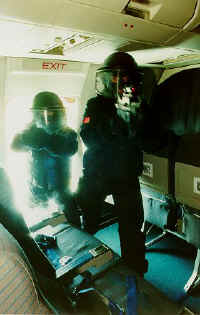

The ARW contributes to the improvement of standards in military and related skills throughout the Defence Forces by;
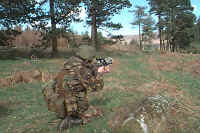
The rapid emergence of new technology and the increasing diversity of potential tasks dictated the requirement for logical contingency planning. The need for a high level of preparedness to deal with any requests for operations of a specific nature is inherent in the Unit mission. From its foundation it was necessary for the ARW to ensure that the highest standards pertained at all levels of the Unit.

Motivation, training and operational flexibility are paramount to success. This is achieved by ensuring the highest level of individual proficiency allied to the C3 (Command, Control & Communications) function; all of which knit together to form cohesive military teamwork. Information on the numerical strength of the unit and the identity of its personnel is restricted

The Selection Course is held annually by the ARW for potential new Unit members. It is open to serving members of the Defence Forces only. Candidates must be medically fit, have a good conduct rating, may be of any rank and must undergo a rigorous physical fitness test.
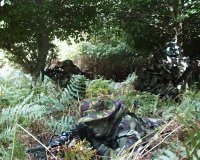
The Selection course is of four (4) weeks duration. The student must cope with physical and psychological pressures and is constantly assessed by instructor staff. The course covers Physical Training, Weapons Handling, Confidence Training, Mountain Navigation, Survival Skills and all aspects of special forces conventional tactics.
Standards required are set at the highest level. Successful students continue with the induction process by completing an ARW Basic Skills Course, which is in effect a probationary period.

The Basic Skills Course is of six (6) months duration where assessment of student suitability to serve in the ARW is detailed and continuous. Students learn all the new skills necessary for membership of the Units' assault platoons.
These skills include :
Throughout the Ranger's career he/she will undergo further specialist training on a continuous ongoing basis ensuring peak of performance at all times. The Ranger will be trained to the highest level of skills such as helicopter rappelling, fast roping, boat handling, sniping, underwater combat diving, explosives intervention, close protection, parachuting and advanced navigation.
These skills are unique to the Army Ranger Wing and affords the Unit much valued flexibility in contingency planning for operational tasks. The Unit is supported by Defence Forces assets such as Air Corps aircraft, Naval Service Patrol Vessels. Army transport and specialised all weather military kit and high tech equipment.
The availability of these assets enables the ARW to train for scenarios based on airborne as well as underwater and surface maritime operations. Training is carried out on gas and oil rigs off Ireland's Atlantic coast, in remote rural areas and in the urban environment.
The ARW conducts parachute training within the Defence Forces and all Unit members are proficient in this area. All trainees must successfully complete five (5) static line jumps from 2,000 feet using T10 round canopies to earn their wings. Selected unit members then progress to free-fall. Rangers who reach a high standard are sent abroad for HALO (High altitude low opening) and HAHO (High altitude high opening) training.

Most ARW parachutists are encouraged to compete in sports parachuting such as accuracy and relative work competitions. ARW members also represent the Irish Defence Forces in the annual World Military Parachuting Championships under CISM (Conseil International du Sport Militaire).
The Naval Service is responsible for patrolling an area of 132,000 sq. mls of sea which is the equivalent of four times the size of the island of Ireland. The sea conditions on the Atlantic coast are often extremely hazardous offering an operational challenge to the ARW which is trained to complement the activities of the Naval Service.

All ARW Combat Divers undergo a Boat Handling Course. On this course the student is introduced to the ARWs inflatable and semi-rigid craft. The Course subjects include Boat Maintenance, Global Positioning System Navigation, High Speed Handling, Interception and Boarding of all types of vessels in all weather conditions. The craft are also used as troop carriers in various roles for Maritime Intervention and Seaborne Operations.
Selected Rangers specialise in Combat Diving and must undergo a two week preliminary Diving Course under the supervision of the ARW diving section. This course involves an introduction to diving and diving equipment. Students gain water confidence and dive in varying conditions and visibility in preparation for the next phase of the course which is conducted by the Naval Service Diving Section at the Naval Base.
This three week course mirrors the Naval Ships Diver Course where the students are introduced to Compass Diving, Ships Bottom Searching, Deep Diving, the Decompression Chamber and Small Boat Handling.

The final phase of the course consists of a seven day period of Combat Diving under the supervision of skilled combat divers from within the Army Ranger Wing. During this week the student learns Harbour and Beach Reconnaissance. Also included is Covert Ship Boarding, ending in a seagoing maritime exercise involving all of the Unit's combat divers.

From the beginning of the induction process each Rangers navigation ability is tested to its maximum. Effective day/night solo all weather navigation, over the roughest of terrain and at varying levels of elevation, is paramount to successful ARW missions. An advanced level of perfected skill is constantly demanded. Participation in military orienteering sporting competitions is encouraged and assists in honing the skill required for reaching and returning from mission imperative objectives. Equipment proficiency ranges from application of the basic map and compass to the more sophisticated Global Positioning System with computerised interface.
One of the ARW primary specialist military skills is Sniping. Up to half of ARW members are fully qualified snipers. This affords the Unit a high degree of flexibility within its various roles. All potential Snipers undergo a rigorous seven-week Basic Sniper Course. On this course the student is taught the Sniper related military skills e.g. Shooting, Camouflage and Concealment, Stalking and Navigation. Having successfully completed this course the student becomes a fully qualified sniper.

Intensive exercises are conducted for selected personnel, sometimes in conjunction with Foreign Special Forces. The Unit trains its Snipers in Anti-Terrorist sniper military skills including Advanced Shooting Techniques, Urban Hides, Co-ordinated Shoot Procedures and Computer Data Transmission.
ARW Snipers are trained to operate in many environments and so the Wing is equipped with an array of specialist weapons to enhance effectiveness.
Some of the weapons in use are :

The locating, observing and reporting on targets are essential skills of the ARW sniper. These three functions are complemented by the invaluable experience gained on front-line duty with the Irish Battalion serving with the UN in South Lebanon. The ARW uses state of the art Digital Technology and Burst Transmission Communications to transmit images and data.
The very nature of ARW operations, involving the manipulation of explosives and munitions, demands meticulous calculation in both the intervention and countermeasure fields. Only the highest standards are accepted. Army Ordnance Corps expertise is recruited into the Unit from among the most adept Explosives Ordnance Disposal Teams (Bomb Disposal) to be found anywhere. These personnel are very familiar with the wide array of improvised explosive devices used by subversive groups here in Ireland, and by militias and various factions in south Lebanon as well as in other peacekeeping missions around the world. This experience is vital to ARW research & development and the supervision of basic and advanced explosives training in the Unit.
The ARW is equipped with state of the art SINGCARS and RACAL communications equipment which provides the unit with secure communications between all it's elements and Defence Forces Headquarters.

Every member of the Unit undergoes an Advanced First Aid Course, run by the Army Medical Corps. The syllabus includes Basic Trauma life-support and covers Intravenous Infusion and Oxygen Therapy. On operations and during training exercises the Units full range of medical equipment will be close at hand, ready to care for any casualties be they ARW personnel or others.
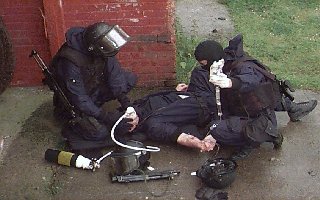
Individuals within the Unit are appointed and responsible to oversee the upkeep and maintenance of the best available medical equipment. It is a source of pride that each Army Ranger has the ability to care for casualties until they are put into the care of the emergency medical services.
As part of the ongoing training the Unit conducts interchanges with Special Forces and Intervention Groups among which are The Royal Dutch Marines, the French GIGN, the Italian CIS, the German GSG9 and the Swedish SSG. Exchanges lead to international co-operation through mutual contact and evaluation of each others specialised skills. ARW individuals selected are of varying service within the Unit and specialise in areas such as diving, sniping, parachuting, medical or explosives.
Members of the ARW also take part in the Irish Defence Forces contribution to overseas Peacekeeping Missions around the world. Over the years these missions have included service in Lebanon, Bosnia, Cyprus, Iraq, Somalia and Western Sahara.
The fully trained Ranger has at his / her disposal a variety of weapons and equipment. The personal weapons at the disposal of the Ranger include:
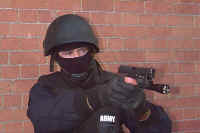
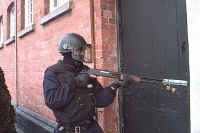
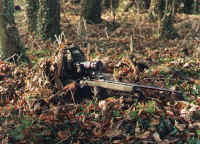


Please visit the Irish Defence Forces Official Site, just follow the puppy...
![]()
Home
FCÁ
ARW
Military Links
Saving Pte Ryan
Get me outa here!